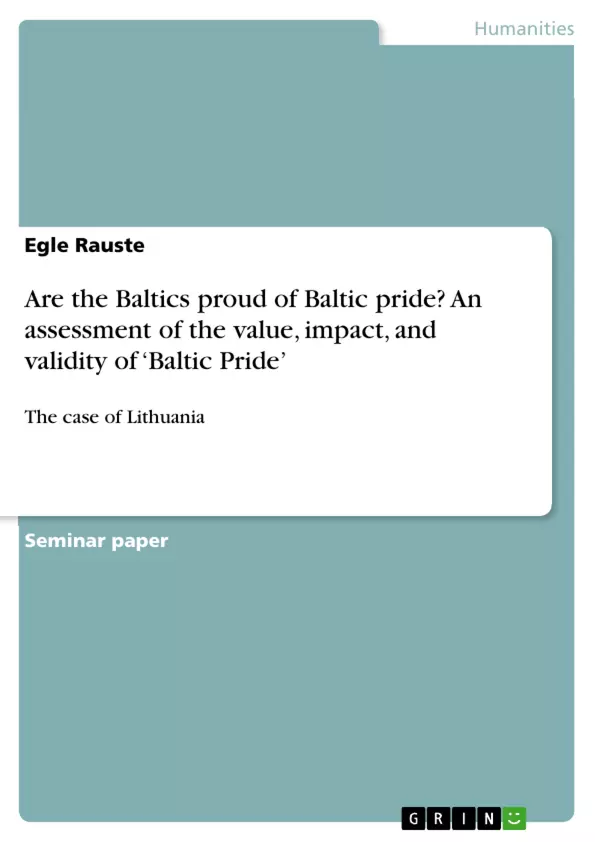By increasing the visibility of the LGBT+ community and advocating for their legal rights, pride parades have contributed significantly in building a society with respect towards sexual and gender minorities and ensuring their legal protections and freedoms. ‘Baltic Pride’ is an annual LGBT+ march that has rotated between the capitals of the Baltic states in turn since 2009. ‘Baltic Pride’ was also initiated as an inclusive approach to foster equality and to promote the rights of and opportunities for members of the LGBT+ community, ultimately enabling them to live authentic lives free from violence and discrimination. Yet, unlike the carnivalesque and glamorous LGBT+ festivities of Western Europe, Eastern European pride events are often situated on the outskirts of cities, outnumbered by the police force, nationalist and religious counter-demonstrators, and frequently result in outbursts of violence, thus merely resembling a celebration of diversity and equality.
The research question is: What value, impact, and validity do pride parades have in predominantly homophobic, biphobic, and transphobic countries? The academic paper is based on the case study method, providing an up-close and in-depth understanding of significance of ‘Baltic Pride’ in Lithuania. The significance of ‘Baltic Pride’ is examined considering its impact on the LGBT+ individuals, its effect on the LGBT+ rights movement at the national level, and implications of these highly charged performances at the international level. The research demonstrates the increasing importance of ‘Baltic Pride’ as it continues to demand for equal treatment across society and urges to develop effective laws and policies to fight discrimination, harassment and violence.
Frequently asked questions
What is the focus of this document?
This document is a language preview, outlining a comprehensive case study assessing the value, impact, and validity of Lithuanian `Baltic Pride' at the individual, national, and international levels. It includes a table of contents, objectives, key themes, chapter summaries, and keywords.
What is `Baltic Pride'?
`Baltic Pride' is an annual LGBT+ pride parade that rotates between the capitals of the Baltic states (Lithuania, Latvia, and Estonia). It aims to increase the visibility of the LGBT+ community and advocate for their legal rights.
What are some of the challenges faced by the LGBT+ community in Lithuania, as highlighted in the document?
The LGBT+ community in Lithuania faces discrimination, exclusion, hate crime, hate speech, and a high number of violent incidents. The document notes the challenges associated with "coming out" due to societal norms and the psychological pressure of remaining hidden.
What methodologies and sources are used in the research?
The research uses a case study method drawing upon disciplines such as social anthropology, sociology, history, legal studies, and psychology. It employs both qualitative and quantitative data, including surveys from the European Union Agency for Fundamental Rights (FRA) and the Baltic News Service (BNS), as well as media analysis and overviews of relevant legislation.
What is the significance of `Baltic Pride' at the individual level, according to the text?
At the individual level, `Baltic Pride' encourages self-acceptance and self-expression among the LGBT+ minority. It provides a sense of belonging and empowerment, and contributes to suicide prevention by assuring LGBT+ individuals that they are not alone and that their identities are valid.
How does `Baltic Pride' impact the freedom of expression and assembly at the national level?
The document notes that the struggle to organize `Baltic Pride' highlights violations of the rights to freedom of expression and peaceful assembly. While there is a growing trend of authorities being more cooperative, limitations and legislative measures intended to hinder the event still affect this fundamental right.
What is the role of the international community in relation to `Baltic Pride'?
`Baltic Pride' attracts the attention and initiative of the international community, leading to pressure on Lithuanian authorities to ensure the human rights of LGBT+ individuals are respected. International organizations and figures have previously called on Lithuania to allow the event to proceed and ensure the safety of participants.
How does `Baltic Pride' impact the migration of the LGBT+ population from Lithuania?
The document suggests that Lithuania's inability to ensure an LGBT-friendly environment, reflected in the controversies surrounding `Baltic Pride', contributes to the country's negative image internationally. Discrimination and ill-treatment can influence the emigration of LGBT+ individuals, and improvements could potentially accelerate the return of emigrants.
What are the aims of `Baltic Pride 2016'?
`Baltic Pride 2016' aims to challenge the discriminatory application of "anti-gay propaganda" laws and initiate a broader public discussion on the legal recognition of same-sex relationships in Lithuania.
- Arbeit zitieren
- Egle Rauste (Autor:in), 2016, Are the Baltics proud of Baltic pride? An assessment of the value, impact, and validity of ‘Baltic Pride’, München, GRIN Verlag, https://www.grin.com/document/369609



